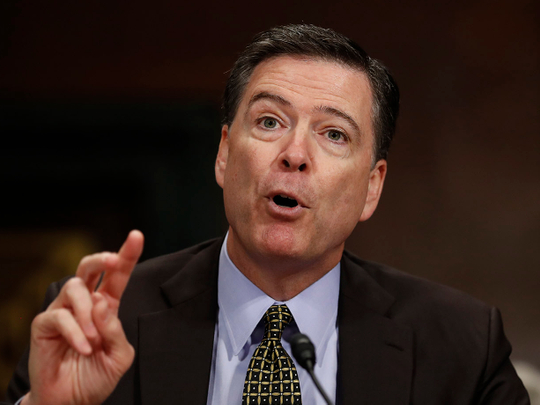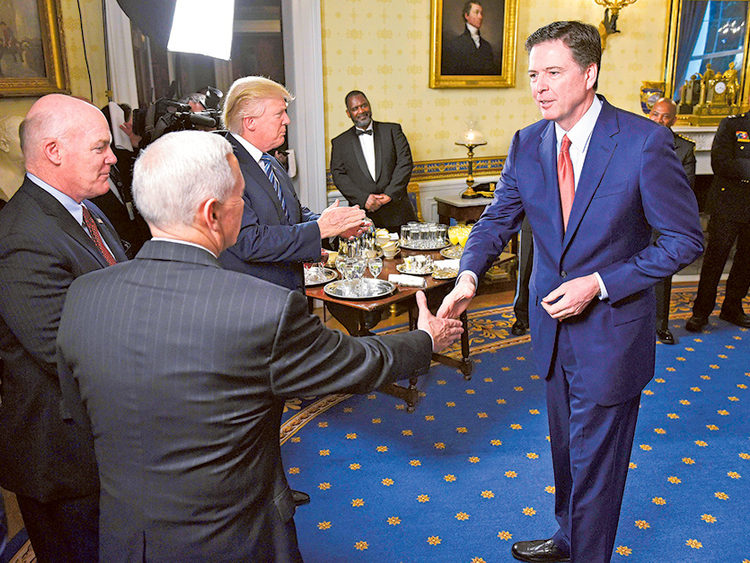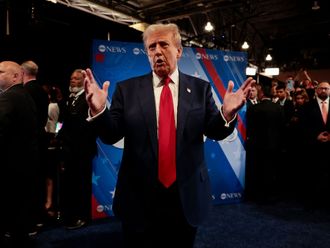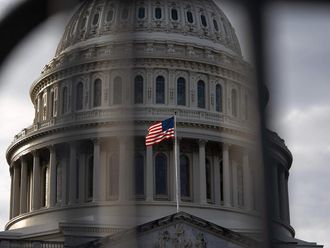
WASHINGTON: President Donald Trump on Tuesday fired FBI director James Comey, ousting the man heading a wide-ranging investigation into whether his aides colluded with Russia to sway last year's US election.
In a shock move that drew comparisons to the Watergate scandal that brought down Richard Nixon, Trump told Comey the FBI needed new leadership and he was being "terminated" with immediate effect.
Under Comey's leadership, the FBI concluded that President Vladimir Putin approved a wide-ranging campaign to tilt the vote in Trump's favor.
His snap dismissal, ostensibly for mishandling a probe into Hillary Clinton's emails, sparked rare criticism from Republicans and allegations of a cover-up from seething Democrats who demanded an independent inquiry.
The high-stakes gambit also raised immediate comparisons to the ill-fated firings that sped the collapse of Nixon's presidency.
Trump's decision to fire the FBI director is virtually unprecedented, only one director has previously been fired in the bureau's century-long history.
In a letter circulated by the White House, Trump told Comey: "You are hereby terminated and removed from office, effective immediately."
"It is essential that we find new leadership for the FBI that restores public trust and confidence in its vital law enforcement mission."
'Troubled'
Trump also used the letter to try to distance himself from the ever-deepening scandal over Russia's involvement in the election.
"I greatly appreciate you informing me, on three separate occasions, that I am not under investigation," Trump wrote.
The White House said the search for a new FBI director was to begin right away.
FBI directors are appointed for a single 10-year term. The 56-year-old Comey, who is popular among rank-and-file agents, was appointed four years ago.
The top Democrat in the Senate, Chuck Schumer, said Trump had made a "big mistake."
"This does not seem a coincidence," he said.
Unless the administration appoints an independent special prosecutor to probe the Russian meddling, Schumer added, "every American will rightly suspect that the decision to fire director Comey was part of a cover-up."
Republicans, many of whom have fallen into line behind Trump after initial reluctance, also sought to distance themselves from the president.
"I am troubled by the timing and reasoning of Director Comey's termination," said Senator Richard Burr.
Congressman Justin Amash, a fellow Republican, described parts of Trump's letter to Comey as "bizarre" and announced "my staff and I are reviewing legislation to establish an independent commission on Russia."
Comey played an outsized - and controversial - role on the American political stage over the past year, lobbing one bombshell after another that rankled both parties in Washington.
The stated reason for his dismissal - according to a memo from Deputy Attorney General Rod Rosenstein - was for mishandling the probe into Clinton's emails, which the Democrat blames for trashing her chances of becoming president.
Comey told lawmakers last week he felt "mildly nauseous" at the thought that he had swayed the election - but could not have acted any other way.
'Nothing less than Nixonian'
Since the start of Trump's presidency, the FBI chief had increasingly appeared to be a thorn in the president's side.
He recently confirmed the agency was investigating Russian interference in last year's presidential election and notably Moscow's possible collusion with Trump's campaign.
Democrats - already angry that Congressional inquiries into Russian meddling have been hamstrung by Republicans' willingness to defend Trump - voiced sharp concerns that the FBI's investigation may now be in jeopardy too, with several calling for an independent commission to take over the probe.
"This is nothing less than Nixonian," charged Senator Patrick Leahy of Vermont, who called Trump's official justification for firing Comey "absurd."
"That fig leaf explanation seeks to cover the undeniable truth: The president has removed the sitting FBI director in the midst of one of the most critical national security investigations in the history of our country - one that implicates senior officials in the Trump campaign and administration," he charged.
When Trump initially decided to keep Comey - a Barack Obama appointee - in his job, it raised eyebrows from critics who saw it as a tacit reward for his role in damaging Clinton's chances.
But within months, the FBI chief was back in the national spotlight - this time taking aim at Trump.
During testimony to Congress last month, Comey overtly challenged the president, flatly rejecting his explosive claim that he was wiretapped by his predecessor.
And despite Trump's dismissal of suggestions his team colluded with Moscow as "fake news," it had become increasingly clear that Comey had set his sights on the issue of Russia's election meddling, which has stalked Trump's presidency from the start.
Comey's year of controversy ends in firing
Here is a timeline of the events that preceded Comey's firing and Trump's reaction to them.
JULY 5, 2016 Comey announced he had recommended no criminal charges filed against Democratic presidential candidate Hillary Clinton for her handling of classified information while she was secretary of state but called her “extremely careless” for using a private email server.
JULY 5, 2016 Trump responded to the news by tweeting that Comey’s decision was an example of a “rigged system” in the United States.
“Very very unfair! As usual, bad judgment,” he tweeted.
OCTOBER 28, 2016 Less than two weeks before the Nov. 8 presidential election, Comey announced in a letter to Congress that the FBI had learned of the existence of emails that appeared to pertain to the Clinton investigation and they would be reviewed whether they contained classified information.
The abrupt decision to renew the investigation upset Democrats who believed the announcement would have an impact on voting trends on Election Day and harm Clinton's chances of victory.
OCTOBER 31, 2016 Campaigning in Michigan, Trump exulted at the news of a reopened probe into actions surrounding an opponent he had dubbed “Crooked Hillary.” "That was so bad what happened originally, and it took guts for Director Comey to make the move that he made in light of the kind of opposition he had where they’re trying to protect her from criminal prosecution," Trump said.
JANUARY 22, 2017 Two days after his inauguration, Trump was at an event in the White House and saw Comey in the audience. He called out to him and Comey strode up and they warmly shook hands and briefly embraced.
“He’s become more famous than me,” Trump said with a chuckle.
FEBRUARY 13, 2017 Trump fired his national security adviser, Michael Flynn, after only 24 days in office after it was disclosed that Flynn had misled Vice President Mike Pence about the contacts he had with Russian ambassador to the United States Sergei Kislyak.
MARCH 20, 2017 Comey, in testimony before the House Intelligence Committee, said the FBI had been investigating possible coordination between the Trump presidential campaign and Russia.
MAY 2, 2017 Clinton told a Women for Women event in New York that the Comey announcement threw the election for Trump. “If the election had been on Oct. 27, I would be your president,” she said.
Trump responded with a late-night series of tweets.
"FBI Director Comey was the best thing that ever happened to Hillary Clinton in that he gave her a free pass for many bad deeds!" Trump tweeted.
MAY 3, 2017 White House spokesman Sean Spicer was asked about Trump’s tweet about Comey.
"The president has confidence in the director,” Spicer told reporters.
May 4, 2017 Comey, in testimony to the Senate Judiciary Committee, said it made him "mildly nauseous" to think his announcement of the reopening of an investigation into Clinton's emails affected the 2016 presidential election, but he had no regrets and would make the same decision again.
In four hours of testimony Comey gave an impassioned defense of his decision to reopen the Clinton probe.
May 8, 2017 ProPublica reported possible inaccuracies about Comey’s statements about Clinton aide Huma Abedin. It said the FBI was said to be preparing to correct the record but that the plan appeared to be on hold with the bureau undecided about what to do.
MIDAFTERNOON, May 9, 2017 At his afternoon daily briefing White House spokesman Sean Spicer was asked whether Trump still had confidence in Comey.
Unlike his statement from a week earlier when he said Trump had confidence in Comey, Spicer equivocated.
"I don't want to start speaking on behalf of the president without speaking to him first," Spicer said.
ABOUT 5:30 PM, May 9, 2017 In a brief appearance in the White House press room, Spicer announced Trump had accepted the recommendation of Attorney General Jeff Sessions and deputy Attorney General Rod Rosenstein to fire Comey. A letter provided to the news media from Rosenstein cited Comey’s handling of the Clinton probe.
The New York Times reported Comey got the news while in Los Angeles where he had been addressing FBI employees there. When a TV in the background flashed the news, Comey at first thought it was a prank, but then got word he had been fired.
At the FBI headquarters in Washington, Trump personal aide Keith Schiller was seen leaving the building. A White House official said he had delivered Trump's letter announcing Comey's dismissal.













